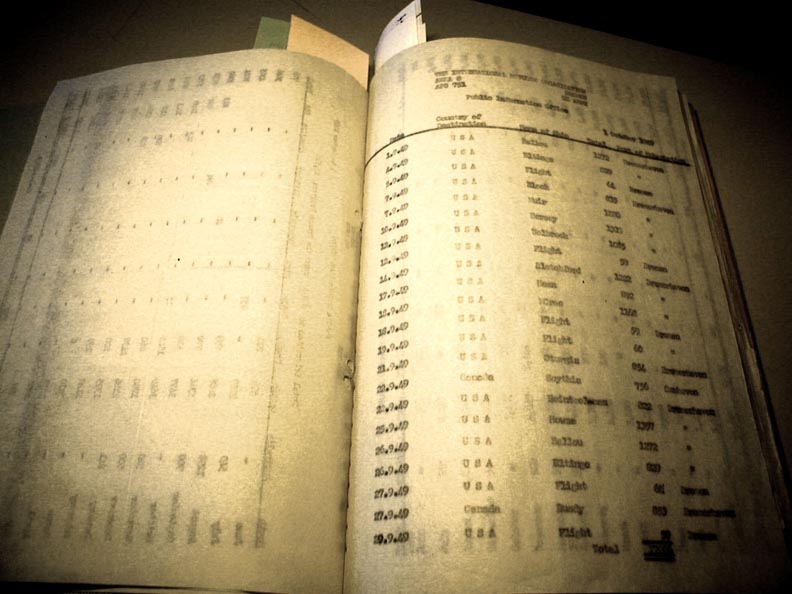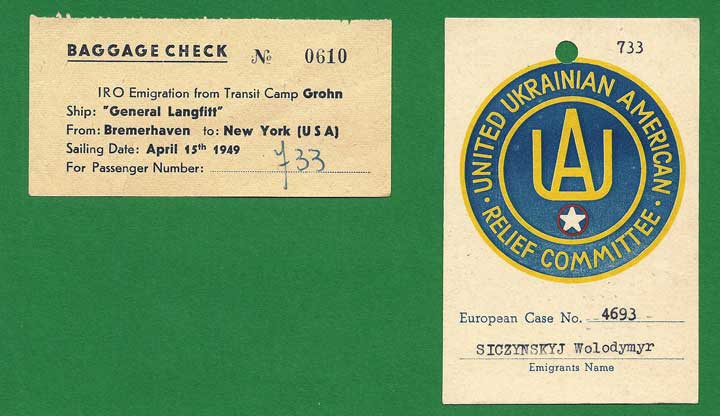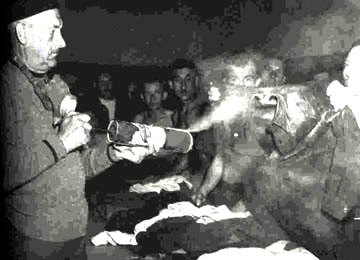Brand
Brassert (2 camps-British zone)
Braunschweig or
Braunsweig, Brunswick,#295, #296 (Poles), #297, #2914, Land Niedersachsen (British
zone)
City archive: Stadtarchiv Braunschweig Löwenwall
18 B
38100 Braunschweig
Phone: (0531) 470-4711 or 4719
Fax: (0531) 470-4725
1945 to 1950
Aus dieser Zeit, in der das Lager offenbar von der Britischen Militärregierung verwaltet und von der UNRRA bzw. nach 1947 von IRO betreut wurde gibt es fast keine Informationen. Man kann davon ausgehen, dass im Rahmen von Repatriierung, Auswanderung und schliesslicher Ansiedlung der "übriggebliebenen" DPs eine grosse Fluktuation der Lagerbewohner vorhanden war. Das Lager Buchholz blieb aber eines der grössten
in Niedersachsen. 1948 wird eine Bewohnerzahl von 1400 angegeben.
Translation by computer of above:
From this time, that camp was obviously administered by the British military
government and cared for by the UNRRA and/or after 1947, by IRO, gives nearly
no information. One can assume in the context of repatriation, emigration and
schliesslicher settlement of the "remaining" DPs a large fluctuation of the camp
inhabitants was present. The camp book wood remained however one the largest
in Lower Saxony. 1400 inhabitants in 1948.
Übergabe des Lagers
an die deutsche Verwaltung
Ab 1950 gehen die DP-Lager in deutsche Verwaltung über, die Bewohner wechseln nicht mehr so stark, müssen aber teilweise noch jahrzehntelang in den Lagern leben, bis sie z.B. Ende der 50-er Jahre in Sozialwohnungen umziehen können. Eine "Lagererhebung in Niedersachsen" (Dezember 1951) ergibt für Hannover die Zahl von 114 Lagern mit 17 284 Bewohnern! Über
das Lager Schierholzstr. 41 fehlen leider die Angaben.
Translation: Delivery of the camp to the German administration:
From 1950, the DP camps change the inhabitants into German administration, change
any longer so strongly, do not have however partly still live for many decades
in the camps, until by the end of the 50's they could move into subsidized low-rent
housings. A "camp collection in Lower Saxony" (December 1951) counts 114 camps
with 17,284 inhabitants for Hanover! The data on camp Schierholzstr. 41 is unfortunately
missing.
1950 until 1964
Über die Zeit bis zur Auflösung des Lagers für "Heimatlose Ausländer" im Jahre 1964 gibt es nur Informationen von wenigen Zeitzeugen aus dem Bereich der "Polnischen Katholischen Mission" und der "Ukrainischen Gemeinde". Alle städtischen Akten des "Flüchtlingsamtes", des späteren "Amtes für Wohnungswesen" und des Sozialamtes Oberfinanzdirektion Hannover hat noch Hinweise, die auf den allmählichen Übergang vom ursprünglichen Lager über die Flüchtlings- und Obdachlosenunterkunft bis zum endgültigen Abriss des übriggebliebenen städtischen Kindergartens und der Aufgabe der Kirche der Ukrainischen Gemeinde in der ehemaligen Gaststätte
von Anni Holik bis zur Wohnbebauung und Errichtung des Bundessortenamtes reichen.
Translation: Until the
dissolution of the camp for "homeless foreigners" in 1964, there is only information from few time witnesses from the range of the "Polish catholic mission" and the "Ukrainian municipality". Still references, which reach on the gradual transition of the original camp over the refugee and homeless person accommodation up to the final outline of the remaining urban kindergarten and the task of the church of the Ukrainian municipality in the former restaurant of Anni Holik up to the residential zone and establishment of the office for federal sort, have all urban documents of the "office for refugee", the later "office for housings" and
the sozialamtes regional finance office Hanover.
More about this camp http://www.geschichtsatlas.de
Book: Karl Liedke Gesichter der Zwangsarbeit (forced workers).
Polen (Polish) in Braunschweig 1939 - 1945.
Braunschweig 1997.
I looked at your list and found Braunschweig DP camp. My neighbor says she was born in 1949 at Braunsweig DP camp (no CH). Are they the same place?? Her last name before marriage was Walas. Thanks Primo de Rivera
Yes, they are the same place. Olga
Dear Olga, I recently found your web site on DP camps. I commend you for your work. It is not easy getting the information. My mother was in DP camps in Germany. Unfortunately she was very young at the time and did not remember names well. She thinks the last camp she was in after the war was near Hannover and Braunschweig. She thinks it was "Rossalia Kasserni" the spelling is probably wrong but do you have any information? It was not one listed on your web site. My mother is Ukrainian from western Ukraine (near Stanislaviv). I believe she was taken into forced labour early in the war. Any information you may have would be much appreciated. My sincere thanks for your help. Roman Kozak
Reply: Hello, the DP camp Rosalies Barracks (in German Rosalies Kaserne) was in Braunschweig. Greetings from Germany, Wolfgang Strobel, author of Post der befreiten Zwangsarbeiter - Displaced Persons Mail Paid in Deutschland 1945 - 1949.
4/12/07
Hi, I am looking for people who worked with the Friends Relief Service Teams at Brunswick, Goslar or Schleswig (both relief workers and DPs who remembered their assistance). The FRS teams worked at a camp in Brunswick nicknamed Gypsy Camp, which was at the airfield known as Broitzem. In Goslar they worked in many camps including one nicknamed Waterfall Camp at the Rammelsberg Mine. If anyone has any recollections of working with or living alongside the Friends Relief Service please do not hesitate to contact me at volunteersabroad@yahoo.co.uk
Many Thanks, Jenny Brauweiler ,
#3200, #43/200; N. Rhine-Westphalia (British zone) outside Koln; Poles, Balts,
Yugoslavs, Belarusians. Photos, e-mails and camp stories on this page.
Brauweiler: memoirs of Andrew Dettre andrew.dettre@bigpond.com
Bremen
Camp Tirpitz was located in a part of Bremen that is called "Gröpelingen". One of the largest Emigrant Staging Centres must have been Camp Grohn in Bremen with up to 5,000 DPs living there before emigrating to the United States or elsewhere.. . . the farewell stop for all DPs except those going by trains. (International Relief Organization IRO) UNRRA Team 510 Bremen:
G. Collins
J. Thomas
Lopez de Nava
J. G. Van Ravenswaay
H. Van Lennep
M. Hesseler
D. Edwards
J. Sauvaget
A. De Poulpiquet
N. Klimenko - Dr.
I'm a German student living in Bremen and writing a final examination about Emigrant Staging Centres in Bremen during the period between 1947 and 1952. I'm looking for any information (letters, memoirs, photos, anything) that can help me to find out more about the centres themselves and especially about the people living in the camps (how did they experience their time in the Bremen IRO camps?) If anybody could help me and has any kind of information or own memories about the time in Bremen, I would be very thankful if you will mail me!
Mail to: silke.puls@arcor.de I've found a list of outgoing ships in September 1949. It contains the date, the name of the ship and the number of people that have been on board.
Update: Mar 9, 2015
Hi Olga
Some years ago a museum on the history of emigration opened in
Bremerhaven (the former port of embarkation) so I wondered if you maybe
would like to put that link on your website:
http://www.dah-bremerhaven.de
It is also possible to donate things (like photos, boarding passes etc.)
to the museum, if people are interested. And they have included a
section on family research. So the museum might be interesting to people
visiting your website for research on their own history.
Best regards from Bremen,
Silke Puls kontakt@silkepuls.de
Bremen Archives: There exists several card files in the Bremen archive. For example, there is a IRO card file, a Canada card file, and several others.
State archive: Staatsarchiv Bremen
Am Staatsarchiv 1
28203 Bremen
Germany
Tel: 0421- 361 6221
Fax: 0421-361 10247
Email: zentrale@staatsarchiv.bremen.de
http://www.bremen.de/info/staatsarchiv
City Archive: Stadtarchiv Bremerhaven
Stadthaus 5
27576 Bremerhaven
Tel: 04 71 - 590-25 67
Fax: 04 71 - 590-20 05
Postfach 21 03 60
27524 Bremerhaven
http://www.bremerhaven.de
Bremerhaven DAD, German databank
9/27/12 Dear Olga:
I am forwarding to you a logo of
United Ukrainian American Relief Commitee....
from 1949 when we departed from Bremenhafen to USA.
Jarko Sichynsky jarkosichynsky@verizon.net
Photo boarding ship at Bremerhaven: http://www.angelfire.com Färderverein Deutsches
Auswanderermuseum e.V.
Inselstr. 6
27568 Bremerhaven
Phone: (0471) 4 90 96 or 4 19 02 88
Fax: (0471) 4 19 02 89
Email: info@foerderv-dt-auswandermus.de
Web site: www.foerderv-dt-auswandermus.de
Historisches Museum
Bremerhaven
http://www.historisches-museum-bremerhaven.de/
Morgenstern-Museum
An der Geeste
27570 Bremerhaven
Tel: 00 49-471-3 08 16-0
Fax: 00 49-471-5 90 27 00
E-mail: info@historisches-museum-bremerhaven.de
City
of Bremerhaven http://www.bremerhaven.de/
Photo
archive http://www.fotoarchiv-bremerhaven.de/ Cargo
of hope DPs come on Navy ships to the US; story and photos.
"We watched them come aboard at Bremerhaven, many
dressed in cast-off clothes and carrying their pitifully meager belongings. First
came the orphans, then the aged and finally the families... Though there were
193 family groups aboard, there were no facilities for quartering families
together. The 374 men bunked aft, the 316 women forward, with cabins reserved
for the aged and for mothers with small children."
Breslau My mother, Gisela Paul, was expelled from Breslau in 1945. She ended up in England in 1949. I believe she was in a British administered DP camp before going to England. I would like to get in touch with any people who were in DP camps at that period. Is there any way I could talk to anyone who was in my mother's situation? Thank you Elizabeth Schmid
Brühl
Landesarchiv NRW Personenstandsarchiv Brühl
Schlossstr. 10-12
50321
Brühl
Tel.: +49 2232 94538-0
Fax: +49 2232 94538-38
E-Mail: psa@lav.nrw.de
Bruckenau a town and fashionable watering-place of Germany, in the kingdom of Bavaria, on the Sinn, 16 m. N.W. of Kissingen. The mineral springs, five in number, situated in the pleasant valley of the Sinn, 2 m. from the town, were a favourite resort of Louis I. of Bavaria. Pop. 1700. Bruckenau today and illustration Brunswick #296 (Poles), #2913 (Poles), #2914 (mostly Poles, Balts, Yugoslavs)
Buchenwald Jews, Poles Post card to Buchenwald
Dr. Knigge Buchenwald Memorial Site Strasse der Nationen 994274 Weimar-Buchenwald
Aug. 9, 2019 Hi Olga,
Thank you very much for all of the info that you sent me! I didn’t know that a search [International Tracing Service -https://arolsen-archives.org/en/ ] was available for me to look into my father’s locations!
My father, Andrew(Andrij) Wenger Born 1924, was wrongly convicted of belonging to UPA and was placed into forced labour from 1943-1945
He spent that in 4 concentration camps, witnessing “Hell on earth”. I will see my father today to confirm that he was in 4 instead of 5.They were Buchenwald, Dachau, Flossenberg and Gross-Rosen.
Thank you again for developing this website.
I sincerely Thank You!,
Mary Wenger marywenger@mymts.net
Hi! Great website! My grandpa survived Buchenwald and emigrated to Argentina. I found out about it only last year. What is the best way to trace him? In 1939 he was in Polish army, but was captured as a Soviet soldier in 1941. His name is Wlodzimierz Wiszniewski. Please help me, Piotr Wiszniewski
Buchholz, #2723,
Land Niedersachsen (British zone), see Hannover-Bucholtz, mostly Poles,
Balts
Buckeburg Hosp.,
#2714 (formerly 2713 ILten), L. Niedersachsen (British zone)
State archive: Niedersächsisches
Staatsarchiv
Postfach 1350
31665 B&3252;ckeburg
Tel: (05722) 9677-3
Fax: (05722) 1289 Buerelle (British
zone)
Buerhassel (British zone)
Buldern - 2 camps (British zone)
Burgbernheim, Jews
Burgdorf has its own page now - UNRRA #2711,
Butzbach (in Hessen)
Olga, This site is impressive.
My husband and his mother were at the IRO camp in Butzbach, 1948-1950. Do you have any information on this camp?
Would appreciate any help. Thank you, Loretta Perner / Spring Hill, Florida
City archiv: Stadtarchiv Butzbach
Marktplatz 1,
Butzbach 35510
Tel: 06033/65005
Fax: 06033/65005
web: http://www.archive.hessen.de
Butzbacher museum associated with the city archive
http://www.butzbach.de
Forced labor:
http://search.yahoo.com
RE: Polska Kompania Wartownicza 4227 Labor Service Co.
Seeking information as to the subject army unit in which my dad, now age 75 years young served as military police with the US Army in Eberstadt with the 97th Labor Supv. Co. from 1945 until emigrating to New York from Butzbach, Germany in September, 1949. My dad was at Manheim Kaefertal 7711 Military Labor Service Training Center Koscuisko from 1945 to
1946. I would appreciate it if any one has any information to please contact me. Thank you so much. P.S.Your web site is not only informative, but very helpful. AGemstone


